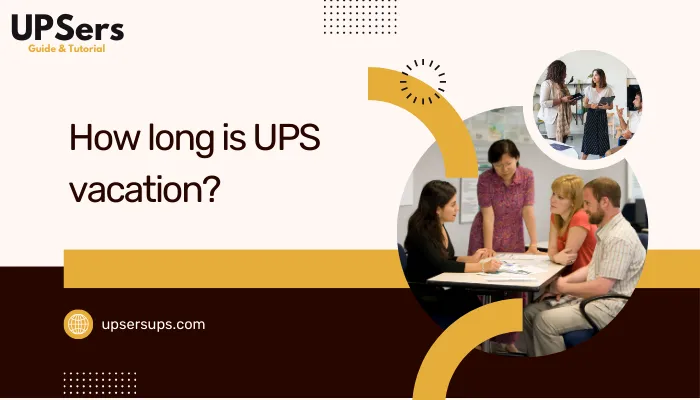How Long Is UPS Vacation? It’s more critical than ever to take a vacation from work in the hectic world of today. For workers at difficult yet rewarding businesses like UPS, this is particularly true.
Navigating vacation restrictions, meanwhile, might be intimidating given the intricate schedule and commitment to provide top-notch service. Help is at hand with this manual!
We’ll go into great length on UPS vacation policy, covering eligibility, accrual rates, and how to get the most of your time off. The value of work-life balance and how UPS programs promote employee well-being will also be discussed. Now, UPS heroes, saddle up and get ready to reveal the keys to a restorative holiday!

Why Knowing Your Vacation Options Is Important?
It’s not just about organizing that ideal vacation to Hawaii—though there’s undoubtedly a benefit—to knowing your vacation entitlement. The following justifies knowing your UPS vacation policy:
- Planning Power: Knowing how many vacation days you have available enables you to make plans far in advance and maximize your time off.
- Reduced Stress: Stress might arise from uncertainty regarding your holiday choices. Effective time management and break scheduling are made possible by knowing your rights and options.
- Enhanced Work-Life Balance Preventing burnout and preserving a good work-life balance need taking holidays. You may plan time for rest and renewal and give your health first priority when you are aware of your vacation limit.
Breaking Down UPS Vacation Policies
After understanding, “How Long Is UPS Vacation?” Let’s go right into the UPS vacation policy.
Knowledge: Usually, after a predetermined length of employment—usually a year—vacation eligibility begins. Your particular job and union membership may determine the precise timeframe.
Vacation Types: UPS provides a range of vacation alternatives to suit your requirements, including Standard Vacation: This is your basic allocation of paid vacation days that build up over time.
Personal Days: Individually paid days off that can be used for appointments, personal errands, or simply a mental health break.
Holidays: UPS extends paid days off all year round in recognition of significant holidays. These are an exclusive UPS benefit that lets you decide between taking more paid time off or converting part of your vacation days to sick leave.
Vacation Accrual: This relates to the procedure of gradually accruing vacation days. Generally, your length of employment determines the accrual rate. Your vacation days add up more quickly the longer you’ve worked for UPS.
Hint: Find out in detail about your eligibility, accrual rate, and possible vacation types by consulting your HR representative or your particular union contract.
How Much Vacation Time Do I Get, Is the Big Question?
Two important variables determine the response:
- Your Tenure: As was already indicated, your tenure with UPS has a direct bearing on your vacation time.
- Your Union Contract: Your union affiliation may have some effect on the particulars of your vacation policy.
The duration of vacations according to tenure is broken down generally here (remember, this is an approximation; for precise information, refer to your official sources):
Less than a year: You might be qualified for a few personal days. Expect a base number of vacation days, usually approximately one week, for 1–5 years. 5–10 years:
You may be able to take two weeks off. 10+ years: You should expect a big increase in vacation days, maybe three or more weeks. Congratulations on your 20+ years! Your vacation packages are the most lavish; they could include up to seven weeks of paid time off.
Remember: This is merely a broad recommendation. For the most up-to-date information about your particular vacation entitlement, always consult your official sources.
Watch for the next part, which will go over how to manage scheduling issues at UPS and maximize your vacation time!
How to Make the Most of Your UPS Vacation?
We’ve covered the main features of UPS vacation policy; now let’s look at how to maximize your well-earned time off:
- Ahead of Time Planning: When you obtain your yearly vacation itinerary, set to work organizing your trips. This lets you get the best airfare and hotel prices, reserve your desired dates, and stay away from disappointment.
- Attack Option Days Strategically Should your contract allow it, think about using option days to convert some of your vacation days to sick leave. If you think you’ll need more sick days this year, this can be a terrific plan.
Use Personal Days: Personal days have great influence; never undervalue them. Divide them up across the year to make longer weekends or vacations.
Communicate Effectively: Discuss your holiday plans with your boss well in advance. This makes scheduling possible and guarantees a seamless operation while you’re abroad.
If it’s practical for your team, talk about the potential of staggered vacations. This can guarantee peak service levels and reduce disturbance to the lowest possible.
Remember Unpaid Leave Though not ideal, taking unpaid leave might be a way to extend your leave of absence, particularly if you have a particular vacation planned. Talk to your supervisor about this option to be sure it fits with operational requirements.
Finding Common Ground in Scheduling Conflicts
Conflicts over schedules can occur even with meticulous preparation. These are some pointers for efficient management of them:
- Adopt Flexibility: Though having your favorite dates is excellent, try to be somewhat flexible. Talk about other times with your boss or coworkers to come up with a mutually acceptable plan.
- Make Early Requests More often than not, especially during busy times, your vacation request will be granted the earlier you submit it.
Provide Solutions: When there is a scheduling issue, provide upfront other options. This shows that you’re dedicated to cooperating and figuring out a win-win scenario.
Direct Communication: Keep lines of contact open about any schedule difficulties with your boss and coworkers. Early discussion of them will enable you to cooperate to find a solution.
Why Work-Life Balance Is Important?
Vacationing is essential for your general health and job effectiveness, not only for fun. Here’s how:
Less Stress and Burnout: You can unplug from the demands of work on vacation, refuel, and come back with fresh enthusiasm and focus. Enhanced Physical Well-Being Better sleep habits and more exercise can result from taking time off.
More Originality and Problem-Solving Taking a break from work helps your thoughts to unwind and consider fresh concepts, which when you return boosts your creativity and problem-solving abilities. Stronger bonds outside of work are fostered by vacations as chances to spend time with loved ones.
Programs to Help You
Understanding the value of work-life balance, UPS provides a number of programs to promote employee well-being:
- Programs for Employee Support For a range of personal and professional issues, UPS offers confidential employee assistance programs (EAPs) with tools and support.
- Health Programs: Fitness classes or wholesome food alternatives are just two of the wellness initiatives that many UPS locations provide to promote good habits.
You may be qualified for flexible schedule choices that meet your individual needs depending on your seniority and job.
Conclusion
In conclusion, “How Long Is UPS Vacation?” You may guarantee a rewarding career at UPS together with a healthy and happy personal life by knowing your UPS vacation policy, taking advantage of your time off options, and putting your work-life balance first.
Never forget that vacationing is an investment in your general success and well-being, not a luxury. Plan your vacations, make the most of them, and you’ll come back to work feeling reenergized and up to any task!
